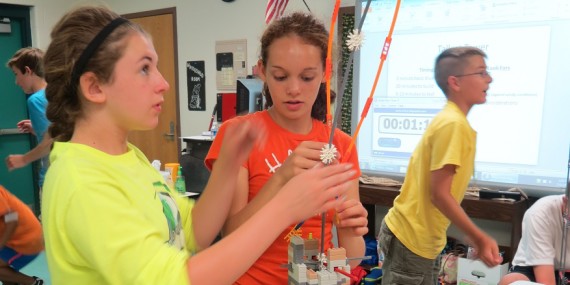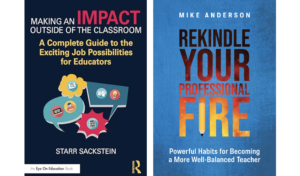A Growth Mindset in Mathematics

Last evening I dislodged myself from home and made the 30-minute drive to Exeter High School to hear a talk given by Dr. Jo Boaler, Professor of Mathematics Education at the Stanford Graduate School of Education. Warm and witty, with a keen sense of purpose and mission, Dr. Boaler gave a fascinating talk about the importance of helping students develop a growth mindset (a term made popular by Stanford colleague, Carol Dweck) in mathematics.
Instead of trying to capture the entire talk in this post, I’d like to share a few highlights—ideas that I found myself thinking about and mulling over on the car ride home.
Math Myths
Dr. Boaler shared two myths about math in the United States that often get in people’s way, creating a fixed mindset about math and effectively shutting down growth and learning.
- Myth 1: “Some people have a gift for math (and some don’t).” This is simply not true, though the number of kids, parents, and even teachers who believe it is can make it a self-fulfilling prophecy. Powerful negative messages about math, especially in relation to girls, bombard kids daily in TV shows, keeping this myth alive and well.
- Myth 2: “Everyone has a math wall—a barrier they can’t go beyond.” Again, this is completely false. Dr. Boaler stated that 95% of all people should be able to take Calculus.
Mindsets Predict Achievement
- Kids who believe that math is a “you have it or you don’t” kind of subject, are less likely to succeed.
- High achieving girls are most likely to have a fixed mindset.
- Students of color and girls are most positively impacted by having a growth mindset about math.
A Few Strategies to Consider (or Reconsider)
- Memorizing is an ineffective tool in math. According to PISA data, kids with the lowest achievement in math rely on memorizing strategies. Kids with the high achievement use patterns, connections, and other strategies. Dr. Boaler was quite clear that although automaticity with math facts is important to higher level math, memorization is a poor way to get there. Instead, kids should learn to see patterns and play with numbers, developing a strong number sense (the most important foundational skill in math).
- Ability grouping in math is associated with lower achievement. Both low and high achievers raise their achievement when ability grouping is given up. Interestingly, high achievers are the ones who most benefit from untracked, heterogeneous math classes.
- Use “low floor—high ceiling” open-ended math tasks. Puzzles, challenges, and real world problems, for which there is no one right way to get there, are more beneficial than “closed” tasks where the goal is to get the right answer. Students need to see math as a “learning subject” instead of a “performance subject.” Students need to be taught strategies for different ways of seeing and representing math thinking using multiple entry points and multiple pathways and strategies.
- Math should never be associated with speed. Stop giving timed math tests. Stress shuts down the brain’s working memory, which is the part of the brain needed for the task in the first place. Timed tests are the early on-set of math anxiety. Many of the great math thinkers are slow and deliberate.
- Reposition mistakes. The brain grows, new synapses fire, when challenged and when mistakes are made. This doesn’t happen when correct answers are given. Mistakes need to be seen as valuable learning tools, not something to avoid.
There was so much more to this talk. The 90 minutes flew by, and I’ve only captured bits and pieces. Toward the end, Dr. Boaler shared a few resources that I’d like to pass along. She offered a few good math sites for kids: Wuzzit Trouble, Motion Math, and www.mathbreakers.com. She also offered her own site as a valuable resource for teachers: www.youcubed.org. I highly recommend checking out this site and learning more about the important work of Dr. Jo Boaler!
Thanks so much to Barbara Hopkins, assistant superintendent of SAU 21, for putting together this wonderful evening!





Comments
Fantastic info to share! We all need reminders of the growth mindset – especially when it comes to math. Another speaker and author I have enjoyed learning from with my two sons is Professor Arthur T. Benjamin, who writes and has DVD’s in the Great Courses series, “The Secrets of Mental Math”. Fun and really gets you to think creatively to solve seemingly impossible math problems!